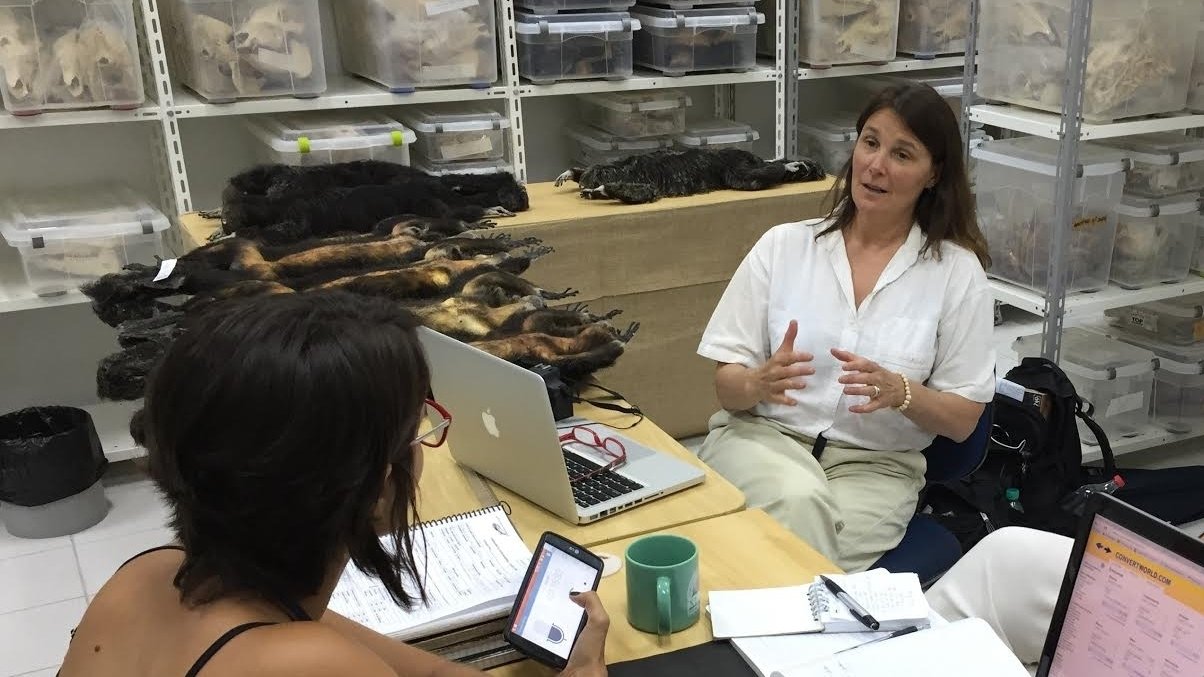
FAQs
Dr. Laura K. Marsh answers your questions
I thought expeditions into the Amazon ended in the 1800s.
Is there really anything new to find there?
Great question! Certainly many important expeditions were done at that time, but expeditions into the Amazon rainforest, which covers Colombia, Ecuador, Peru, Brazil, and Bolivia, have continued through the present day.
This is a vast region, and it is impossible to know everything about it. Large expeditions like ours are rare, typically because of funding restrictions. However, small field research expeditions for 2 - 4 weeks are often carried out, even by local field biologists.
This is the Amazon basin. Really big.
It happens that the region where we went to for Houseboat Amazon is difficult and expensive to get to and to explore. For the saki monkeys we looked for (Pithecia vanzolinii), the last collecting expedition (meaning they went to an area and shot every animal they could find to take back to a museum for study) was in the 1930s. Other Brazilian research projects have been conducted in the region, but none have seen the sakis we looked for and none have gone for as long or as far as we went.
In this era of climate change, the scarier prospect is not doing expeditions, as data are showing as much as an 80% decrease in normal bird populations, due to longer, more pronounced droughts in the Amazon (Dr. Betty Loiselle, pers comm). We are off to set a baseline, at a time when populations of all species, including plants, may be severely impacted.
Why is this expedition important?
This expedition is important for several reasons.
First, there are no other museum specimen primates that I know of, that we have not seen alive in the wild. It's a big deal to science to have been missing something as large as a saki monkey!
Second, this expedition was more than finding the missing monkey. As the study area had no mammal baseline data we did a "wall to wall" mammal survey and reported everything we encountered. This means we also learned about hunting, fishing, and forest use by local people.
Third, all animals are important to the maintenance of their habitat. As they are interconnected with plants, they need each other for survival. Sakis are seed predators and while we are unclear about what that means to rainforest alone, we know that primates in general prune trees, eat their fruit and disperse their seeds. If we lose even one species, ecosystems start to collapse internally.
Finally, the more we know about the animals living in this forest, and understand their people's needs, we can work together to develop conservation goals.
Why do you think you are the ones who can make this expedition happen?
Every team is different. Think of the Avengers vs. Guardians of the Galaxy. Each of these teams are unique because of the skills and personalities of the team members. Both ultimately achieve their goals, but do so in very different ways.
Our team is uniquely qualified to develop and execute this expedition because together we fill in all of the necessary gaps for the project. We all are trained field biologists, but as you will see on our “About" page, we each bring a critical role to the success of this project. Understand, a big expedition like this is not only about doing good science and seeing interesting things. It is about the logistics, the planning, the organizing, and execution of the expedition itself which is why I picked everyone I did. Everyone on the HBA Team is committed to this project, are good at what they do, and have experience doing those things for other expeditions.
This all sounds like an adventure. Is it really science?
In the Amazon, science is always adventure! The two are the same. Rainforest is unpredictable. The animals we are looking for are unpredictable. And every day the forest wakes up and shifts a bit, so even if you saw something one day, one hour in a certain tree, it will change. The excitement of discovery is always a part of Amazon work. And—living on a houseboat, eating the fish we catch, bathing in the river, keeping our electronic equipment dry in the 100% humidity—all of it is challenging adventure.
All of science, physics, chemistry, biology—all of it tells a story. The stories are as different and interesting as any fiction novels out there. But science in the Amazon for us is based on observation—and that's where YOU the public come in!
Because of social media and the availability of video cameras, we can bring the story of our work—on the houseboat with each other, to the forest where we will discover interesting animals and plants—to you. With the documentary film we are proposing to make, everyone will get a chance to share in the adventure of science.
Will we be getting daily updates on your progress?
I hope so! We are looking into satellite phones and links right now so that we will be able to live stream. If we cannot, we will "package" reports and send them out to our colleague in Cruzeiro do Sul, Dr. Marco Athaydes, who will be able to upload the information to the website. We will try to be as "live" as possible from the middle of the remote, no electricity available jungle! But remember, it IS remote, so if you don't hear from us, don't panic!
Where will you get your electricity in the middle of the jungle?
The houseboat ("barco") is wired to the on board electrical system. There are lights and plugs in the cabins and throughout the boat. That will be great for a back up system, but we are bringing a full series of solar panels and batteries to wire the boat and for powering our equipment. We will also have at least two gas generators. The diesel engine of the barco uses a lot of fuel, so we want to conserve it as much as possible by using solar and generators.
How would you even know this is the right monkey even if you did see it?
Have you seen this guy?
First, sakis (the Pithecia genus) are very distinct. Read about them here.
And second, these are the only saki monkeys—in fact the only monkeys in the Amazon forest—who have very buffy-gold arms and legs with a black body!
Seriously, we can't miss them!


